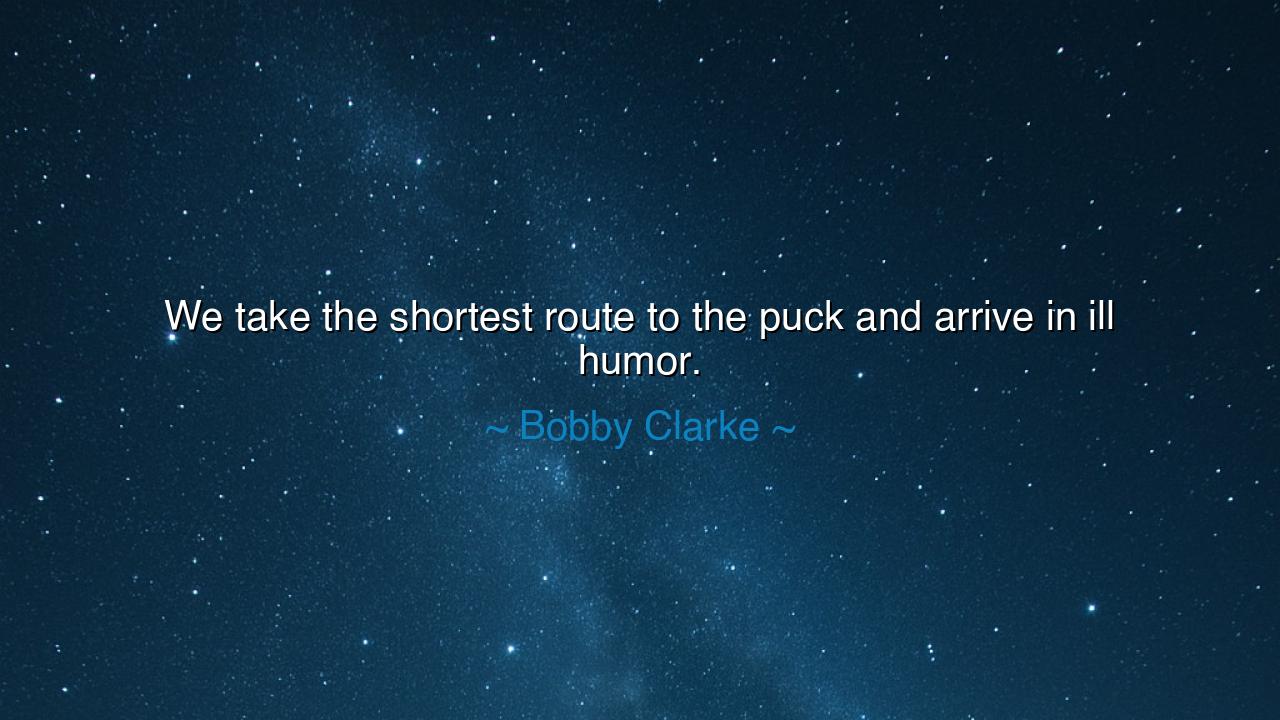
We take the shortest route to the puck and arrive in ill humor.






When Bobby Clarke said, “We take the shortest route to the puck and arrive in ill humor,” he was not merely describing a strategy of hockey — he was speaking the language of warriors. Beneath the simplicity of his words lies the spirit of grit, discipline, and purpose that transcends the ice. It is a statement that reveals how determination and intensity can shape character — that the shortest path to victory is not paved with ease or grace, but with fierce will and unyielding drive. Clarke, captain of the Philadelphia Flyers during their legendary “Broad Street Bullies” era, was not just talking about speed — he was talking about attitude, the ferocity of those who refuse to hesitate when facing the goal.
To “take the shortest route to the puck” is to live with clarity of purpose. It means cutting through distractions, hesitation, and doubt — reaching for what matters without fear of pain or conflict. And to “arrive in ill humor” is to arrive with passion, with intensity so pure it borders on anger — not the destructive kind, but the fire that fuels greatness. In sport, as in life, this is the essence of competition: the recognition that success does not come to those who are polite with destiny. It comes to those who face it head-on, who meet every challenge with the full force of their being. Bobby Clarke’s words are not about aggression alone; they are about the courage to confront life without hesitation.
The ancients would have understood this creed. The Greek warriors of old — the Spartans — were taught to take the direct path, both in battle and in life. Their discipline was not born of cruelty, but of purpose. They understood that in every struggle, whether on the field or within the soul, delay is defeat. Clarke’s quote echoes this ancient wisdom. His “shortest route” is the way of the disciplined mind — free from hesitation. His “ill humor” is the spirit of one who knows that victory is not born of charm, but of fierce devotion to the task. Just as the Spartans met the enemy with spear and shield, so too does the athlete — and the human being — meet adversity with focus and fury.
Yet Clarke’s words carry more than the spirit of battle; they carry the philosophy of resilience. He was not the biggest or fastest player, but he was among the fiercest. Born with diabetes — a condition that could have ended his athletic career before it began — he fought every game not only against opponents, but against his own body. His “ill humor” was the expression of defiance against limitation. When others slowed, he pushed harder. When others hesitated, he struck. Through his leadership, the Flyers became a force not just of skill, but of collective will. His quote reminds us that sometimes, to reach greatness, one must embrace discomfort, even anger — for passion, when guided by purpose, becomes power.
We see this truth reflected far beyond the ice. Consider Winston Churchill, who led his nation through the darkest nights of war. He, too, “arrived in ill humor” — not of cruelty, but of conviction. His speeches thundered with defiance, his will unshaken even when all seemed lost. Like Clarke, he understood that gentleness alone cannot conquer chaos; sometimes the soul must burn with righteous fury to carve a path through the storm. Both men knew that leadership demands intensity — a willingness to meet hardship not with complaint, but with energy so fierce that even despair retreats before it.
Still, Clarke’s words also carry a quiet warning: the same fire that propels victory can consume the heart if left unchecked. To arrive “in ill humor” is powerful when directed toward the task, but dangerous when turned against others. The ancients taught this balance well — Aristotle called it the “golden mean,” the harmony between passion and restraint. Fury must be the servant of purpose, not its master. Clarke’s greatness lay not only in his ferocity, but in his discipline — he knew when to strike, and when to lead. Thus, his quote is not a call for rage, but for focused strength — the ability to channel one’s emotions into action without being ruled by them.
So, what can we learn from Bobby Clarke’s wisdom? It is this: move directly toward your goals, without delay or apology. Let your effort be honest, your passion unhidden, your energy fierce. But let your anger serve your purpose, not blind it. When life presents obstacles, take the shortest route — through them, not around them. Arrive not timidly, but with the determination of one who knows what they seek and will not be denied.
For in the end, as Clarke reminds us, success belongs not to the polite or the hesitant, but to the brave — those who meet the moment “in ill humor,” not because they despise the struggle, but because they love the fight. The ancient heroes would have recognized this creed: that the soul alive with purpose must sometimes burn, that passion is not weakness but proof of life. To face the puck — or destiny — with such spirit is to live as all warriors, athletes, and dreamers must: with eyes forward, heart ablaze, and no wasted motion between oneself and the goal.






AAdministratorAdministrator
Welcome, honored guests. Please leave a comment, we will respond soon